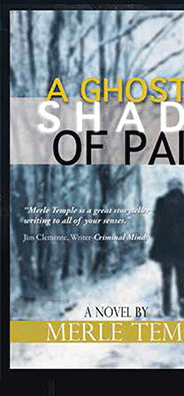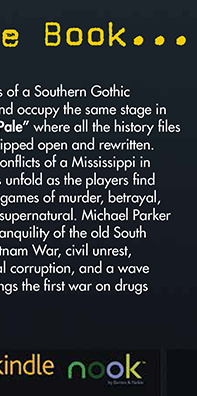 |
|

    |
|||||||||
 |
|||||||||
|
With the dawning of the Woodstock generation, a battle was brewing between the powers that be and the emerging counterculture for the very heart and soul of America. In response, President Nixon declared his “War on Drugs” in June 1971 targeting dealers, suppliers and users by dramatically increasing the size and presence of federal drug control agencies, and pushing through mandatory sentencing. One of the agents on the front line of this war was Tupelo, Mississippi native Merle Temple. As the first Captain in the Mississippi Bureau of Narcotics, he witnessed the devastation that the drugs and their handlers brought to the region. Now, over 40 years later, Temple brilliantly recounts this time in our history, sharing his firsthand knowledge of fighting in the trenches of America’s Drug War in the action-packed thriller, “A Ghostly Shade of Pale.” This novel is the first in a trilogy of Temple’s semi-autobiographical tales of betrayal, corruption, murder—and yes, eventually, redemption. Depending on one’s age, gender or socioeconomic status, the South in the 1970’s could best be described as “A Tale of Two Cities.” To me, an Atlanta high school honor student whose greatest concerns were grades, Prom and trying to copy Farrah Fawcett’s iconic hairstyle, the ’70s were the best of times. But to Merle Temple, it just might have been the worst. As Criminal Minds’ producer Jim Clemente wrote in the novel’s forward: “Ghostly is a crime story as literature. Merle Temple is a great storyteller, writing to all of your senses. He weaves a story so detailed and complex, yet beautifully sinister, that the reader is immersed in the feeling of absolute reality.” Just as an artist becomes one with his brush and creates beauty on canvas, author Merle Temple wields pen to paper and with the written word, creates a stunning portrait of “a surreal moment in time, a snapshot from an opera of insanity; where truth has no currency and justice means ‘just us’.” One expects violence and mayhem in an action/suspense/thriller about the drug wars—and they were all there, of course—but my heart was unexpectedly touched by the tenderness that also sweeps across the pages of “A Ghostly Shade of Pale.” Michael Parker, our protagonist and Merle’s alter ego, has an unabashed respect for God, duty and his country. Within the Mississippi Bureau of Narcotics, he is an idealist, fighting on the side of the Angels, and he is obsessed with bringing to justice the evildoers profiting from the new drug culture. But in his private life, Michael Parker has the soul of a poet; a poet who would move heaven and earth for his beloved Dixie. Dixie is the woman from his past who was once lost to him, but is now firmly entrenched in his heart. By chance encounter (or Divine appointment), Michael rescues her from a dive bar surrounded by the very criminals he is about to take down. More importantly, he gets her out of the clutches of Frank, a “charmer who elevated the broken bird with lavish attention, only to withdraw and heighten the savagery of the clenched fist disguised as the helping hand—a hammer to render her subservient.” Awash in his forgiveness and compassion, Dixie blossoms under the tender mercies of Michael. But it’s Michael’s gentle love for his grandmother, Pearl that plucks at the heart strings so poignantly. She is his anchor, his touchstone. In a world fraught with danger and betrayal at every turn, Pearl is his constant, a fount of unconditional love. She’s always at the ready with the soft peppermints that he’s so tickled to get and she’s just as tickled to give to her grandson—her love offering to him. Of his sweet grandmother, Michael says, “She had a joy the world did not give her and that the world couldn’t take away.” **** It was my honor to sit with Merle and his lovely wife, Judy as they made their way home to Tupelo after a very successful book signing in Augusta, Georgia. As we talked about “Ghostly” that afternoon, we kept one eye on the weather, because the Polar Vortex was descending, and the Temples were determined to beat “Snowpacalypse” home! (As it turned out the meteorologists had not exaggerated—snow and ice shut the southeast down for days.) Spend any time with Merle, and you realize that this man is not just a brilliant writer, but he really is a throwback to genuine storytellers of old. Our conversation ran the gamut from discussing some of the passages of “Ghostly” to our shared Southern heritage, and moved on to our mutual devotion to the Lord. I was enthralled as Merle reminisced about his years as a field agent. Upon graduating from the University of Mississippi in 1971, he hit the ground running in the Narcotics Bureau—so young, so idealistic. Stings were successful and arrests were made; Merle and his team were so accomplished at taking down the bad guys that he became perceived as a threat to the status quo. In fact, it was as if there was a bull’s-eye emblazoned on his back—not only was he a target of organized crime bosses, but corrupt politicians, as well. Over the years Merle realized that the bad guys didn’t always wear black hats and the good guys weren’t always so good. As the War on Drugs dragged on, beliefs that had once seemed black and white began to fade into shades of gray. Merle said, “I hope that “Ghostly” delivers tenderness amidst the darkness, the tension of monsters all about, a teetering view at the edge of the abyss, and a sudden escape route that is not temporal but supernatural. My intention is take the reader to a place they’ve never been, but one they’ve always dreamed of where the inhabitants are not strangers. I wanted it to be a fresh story—yet one as old as humankind that could be their own.” Merle is truly a Renaissance man, and at a time in his life when most men would be retiring to golf or to travel, he is working on “A Rented World,” his second book in the trilogy. When he’s not writing, Merle is criss-crossing the country from Los Angeles to Augusta promoting “Ghostly” on book-signing tours, meeting his enthusiastic readers and doing television and radio interviews (Click here to hear a recent radio interview). “Ghostly” has stirred interest with the producers of Criminal Minds—Merle signed a book for the executive producer Erica Messer, and writer-producer, Jim Clemente, who represents Merle in Hollywood. Additionally, he signed books for the cast of Major Crimes, and he also enjoyed a three-hour dinner meeting (in an industry and town where it’s unheard of to get 15 minutes with a mid-level executive at a studio) with the producers of “The Patriot” and “Saving Private Ryan;” they are discussing ways to bring “Ghostly” to the big screen. But Merle has certain stipulations. “‘Ghostly’ is written as literature to endure, not just another throw-away item in a throw-away world,” he told me. “There is no profanity and no scenes of explicit intimacy. The words writers write today are like epitaphs on our tombstones. I don’t want someone to stroll through the graveyard of my novels thirty years from now and remember me for language that does not uplift and edify.” Consequently, any production of “Ghostly” must also uplift and deify, or it just will not happen. Merle sees this novel as his ministry; get the book in the hands of readers, then share with them the story of redeeming grace and the God that bestows that grace so freely. As we wrapped up our time together, I pressed Merle to tell me how he and (the “Ghostly” protagonist) Michael are most similar. Merle thought a moment, then confided, “Like me, Michael realizes that there are still battles worth fighting and risking everything for when he looks behind him in the darkest of times and discovers that goodness and mercy are still following him all the days of his life.” **** The snow storm was fast approaching, and it was time for the Temples to start their journey home. We walked to Merle’s car and noticed how bitterly cold the air had become. As I hugged them both goodbye, Merle turned back to me, and quoted what I had shared with him earlier was my favorite Michael line in the book. With a smile and a thumbs up, Merle said, “While I breathe, I fight.” Oh yes, indeed! What had begun as chat with an author about his latest book ended with me knowing I’d been blessed with two new dear friends—the kind I’d give my house key to. Come back any time, y’all. I’ll keep the light on. |
|||||||||
|
|
|||||||||




